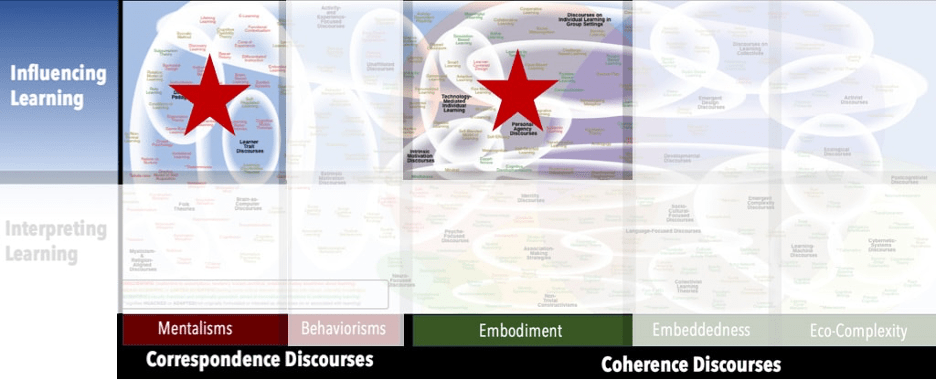Focus
Supporting holistic learning by focusing on a specific phenomenonPrincipal Metaphors
Phenomenon-Based Learning is not especially attentive to assumptions and assertions around the actual phenomenon of learning, and so a wide range of notions tend to be invoked. In the documents we reviewed, notions associated with the Attainment Metaphor figured most prominently:- Knowledge is … a territory/area/domain/field
- Knowing is … attaining a goal
- Learner is … a seeker (individual)
- Learning is … journeying (arriving at, reaching, progressing, accomplishing, achieving)
- Teaching is … leading, guiding, directing, facilitating
Originated
2010sSynopsis
Phenomenon-Based Learning (PhBL or PhenoBL) begins with the assertion that the parsed and decontextualized nature of traditional, discipline-based schooling is not fitted to the times. At its name suggests, Phenomenon-Based Learning is developed around a specific topic, object, person, happening, or concept – which should be authentic to learners, interdisciplinary, contextualized, concrete, and derived from the real world. While not always the case, proponents typically align with Deeper Learning, Inquiry-Based Learning, Problem-Based Learning, and Project-Based Learning. Subdiscourses include:- Integrated Thematic Instruction (Susan Kovalik, 1980s) – a model that operates at the school level, designed to improve both student performance and teacher satisfaction through weaving all subjects around compelling themes.
- Thematic Learning (Thematic Instruction;Thematic Studies; Thematic Teaching; Theme-Based Learning) (Cynthia WilliamsResor; 2010s) involves structuring a unit, course, or multiple courses around a unifying theme. Aimed at a holistic learning, and more commonly encountered in elementary schools, it is typically rooted in the worlds of the learners and often interdisciplinary.
- Topical Learning (Topic-Based Learning) (various; 2000s) is, as it sounds, structured around a specific concept or event, through which all curriculum areas of connected. Typically, learners are involved in identifying the topic and its study extends over weeks and months.
Commentary
The literature surrounding Phenomenon-Based Learning tends to be jargon-rich and theory-poor, and so it can be tempting to read it more as a mash-up of current educational obsessions than a substantial contribution to the field. For instance, “constructivism” was prominently invoked in every artefact that we reviewed on the topic, but there was never indication of the wide range of foci and sensibilities represented across constructivist discourses (see, e.g., Construction Metaphor and Non-Trivial Constructivisms). This failure to attend deeply to the theoretical discourses that it invokes, along with the fact that it originated in post-secondary institutions, are useful for understanding the its insistence on practicality and situatedness.Authors and/or Prominent Influences
Vasileios Symeonidis; Johanna SchwarzStatus as a Theory of Learning
Phenomenon-Based Learning is not a theory of learning.Status as a Theory of Teaching
Phenomenon-Based Learning is a theory of teaching.Status as a Scientific Theory
As noted above, proponents of Phenomenon-Based Learning frequently assert that they draw on “Constructivism,” but that point never seems to be developed in a manner that makes it possible to discern if they are referring to the Construction Metaphor or to Non-Trivial Constructivisms. Additionally, while it claims empirical support, its evidence base is very limited and mainly reliant on associated discourses. Concisely, then, Phenomenon-Based Learning falls short on all our criteria for a scientific discourse.Subdiscourses:
- Integrated Thematic Instruction
- Thematic Learning (Thematic Instruction;Thematic Studies; Thematic Teaching; Theme-Based Learning)
- Topical Learning (Topic-Based Learning)
Map Location

Please cite this article as:
Davis, B., & Francis, K. (2023). “Phenomenon-Based Learning” in Discourses on Learning in Education. https://learningdiscourses.com.
⇦ Back to Map
⇦ Back to List
